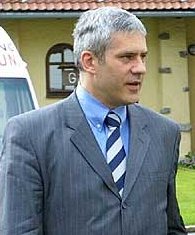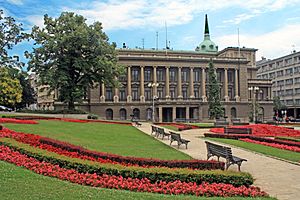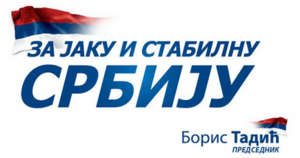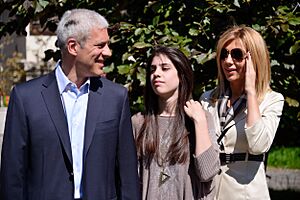Boris Tadić facts for kids
Quick facts for kids
Boris Tadić
|
|
|---|---|
|
Борис Тадић
|
|
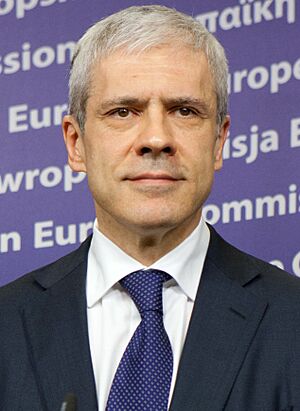
Tadić in 2012
|
|
| President of Serbia | |
| In office 11 July 2004 – 5 April 2012 |
|
| Prime Minister | Vojislav Koštunica Mirko Cvetković |
| Preceded by | Predrag Marković (acting) |
| Succeeded by | Slavica Đukić Dejanović (acting) Tomislav Nikolić |
| Minister of Defence of Serbia and Montenegro | |
| In office 17 March 2003 – 16 April 2004 |
|
| President | Svetozar Marović |
| Preceded by | Velimir Radojević |
| Succeeded by | Prvoslav Davinić |
| Minister of Telecommunications of the Federal Republic of Yugoslavia | |
| In office 4 November 2000 – 7 March 2003 |
|
| President | Vojislav Koštunica |
| Prime Minister | Zoran Žižić Dragiša Pešić |
| Preceded by | Ivan Marković |
| Succeeded by | Office abolished |
| Personal details | |
| Born | 15 January 1958 Sarajevo, PR Bosnia and Herzegovina, FPR Yugoslavia |
| Political party | DS (1990–2014) SDS (2014–present) |
| Spouses |
Veselinka Zastavniković
(m. 1980; div. 1996)Tatjana Rodić
(m. 1997; div. 2019) |
| Children |
|
| Parents |
|
| Alma mater | University of Belgrade |
| Signature | |
Boris Tadić (born 15 January 1958) is a Serbian politician who was the President of Serbia from 2004 to 2012. He is known for his efforts to bring Serbia closer to the European Union and for promoting peace in the Balkan region.
Born in Sarajevo, Tadić moved to Belgrade as a child. He studied psychology at the University of Belgrade. Before entering politics, he worked as a journalist, a military psychologist, and a high school teacher.
In 1990, he joined the Democratic Party (DS). After the fall of Slobodan Milošević's government in 2000, Tadić became the minister of telecommunications. Later, he served as the minister of defence. He became the leader of the Democratic Party after its previous leader, Zoran Đinđić, was assassinated.
Tadić won the presidential election in 2004 and was re-elected in 2008. During his time as president, he worked to improve relationships with neighboring countries that were once part of Yugoslavia. He also focused on Serbia's goal of joining the European Union. In 2012, he lost the presidential election to Tomislav Nikolić. After leaving the presidency, he formed a new political party.
Contents
Early Life and Education
Boris Tadić was born in Sarajevo, which was then part of Yugoslavia. His father, Ljubomir, was a philosopher, and his mother, Nevenka, was a psychologist. His family has roots in the Piva region of Montenegro. When he was three, his family moved to Belgrade.
He attended high school in Belgrade and played water polo for a famous club, VK Partizan. He had to stop playing because of injuries. He later graduated from the University of Belgrade with a degree in social psychology.
During his university studies in 1982, he was arrested for taking part in a protest. He spent a month in prison for his actions. After graduating, he worked as a journalist and taught psychology at the First Belgrade Gymnasium.
Start of His Political Career
Tadić joined the Democratic Party (DS) in 1990, when it was first created. In 1993, he was elected as a member of Serbia's parliament, called the National Assembly.
The Democratic Party was a leading force in the movement that removed President Slobodan Milošević from power in 2000. After this change, Tadić was appointed Minister of Telecommunications for Yugoslavia. From 2003 to 2004, he served as the Minister of Defence.
In March 2003, the leader of the Democratic Party and Prime Minister of Serbia, Zoran Đinđić, was assassinated. This was a major shock for the country. In 2004, the party held an election to choose a new leader, and Boris Tadić won.
President of Serbia (2004–2012)
As the new leader of the Democratic Party, Tadić ran for president in 2004. He won the election and was sworn in on 11 July 2004.
One of his first actions was to create the People's Office. This office was designed to help citizens communicate with the president and get help with their problems.
First Term (2004–2008)
During his first term, Tadić focused on healing the wounds from the Yugoslav Wars of the 1990s. He worked to build better relationships with other countries that were once part of Yugoslavia.
- In 2004, he visited Bosnia and Herzegovina and apologized for crimes committed in the name of the Serbian people.
- In 2005, he visited the Srebrenica Genocide Memorial to honor the victims of the 1995 massacre.
- In 2007, he apologized to Croatia for crimes committed during the war there.
In 2006, Montenegro held a vote and became an independent country, separating from Serbia. Tadić was the first foreign leader to visit the newly independent Montenegro. He promised that the two countries would remain friends.
Tadić also pursued a pro-Western foreign policy, aiming for Serbia to join the European Union (EU). In 2005, he met with Pope Benedict XVI, becoming the first Serbian head of state to have an official meeting with a pope.
Re-election and Second Term (2008–2012)
Tadić ran for re-election in 2008 and won again. His campaign focused on the goal of joining the EU while also protecting Serbia's interests, especially regarding Kosovo.
Shortly after his re-election, Kosovo declared independence from Serbia in February 2008. Tadić and the Serbian government stated that they would never recognize Kosovo's independence. He called for a peaceful solution to be found through talks with international support.
Under his leadership, Serbia continued to move closer to the EU.
- Serbia signed the Stabilisation and Association Agreement (SAA), a key step toward EU membership.
- The EU allowed Serbian citizens to travel to many European countries without a visa.
- In 2012, Serbia was officially named a candidate for EU membership.
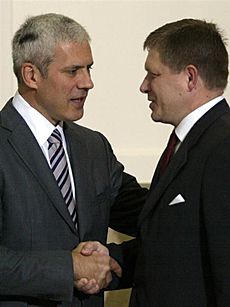
Tadić's government also faced challenges, including the global financial crisis of 2008, which slowed down Serbia's economy.
In 2009, a man entered the President's office with two hand grenades, upset about a court case. Security forces managed the situation carefully. After several hours of negotiation, the man was disarmed and arrested without anyone getting hurt.
Post-Presidency
In April 2012, Tadić decided to step down early to allow the presidential election to happen at the same time as the parliamentary elections. In the election held in May 2012, he ran for a third term but lost to his opponent, Tomislav Nikolić.
After the election, Tadić stepped down as the leader of the Democratic Party. In 2014, he left the party and formed a new one, which was later named the Social Democratic Party. His new party has remained active in Serbian politics.
Personal Life
Boris Tadić has been married twice. His first marriage was to Veselinka Zastavniković. His second marriage was to Tatjana Rodić, with whom he has two daughters, Maša and Vanja.
His sister, Vjera, is a psychologist. Besides his native Serbian, Tadić can speak English, French, and Italian. He is known for being very tall, at 1.88 meters (6 feet 2 inches).
Awards and Honors
Tadić has received many international awards for his work in politics and for promoting peace and tolerance.
- European Prize for Political Culture (2007) for his contributions to politics.
- Quadriga Award (2008) from Germany for his "Courage of Perseverance."
- North-South Prize (2011) from the Council of Europe for his work on human rights and democracy.
- European Medal of Tolerance (2012) for his efforts to promote reconciliation in the Balkans.
See also
 In Spanish: Boris Tadić para niños
In Spanish: Boris Tadić para niños
 | William L. Dawson |
 | W. E. B. Du Bois |
 | Harry Belafonte |


